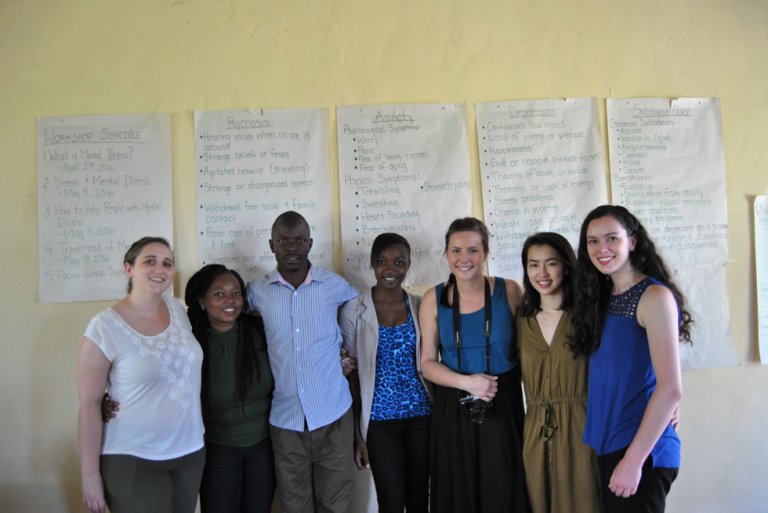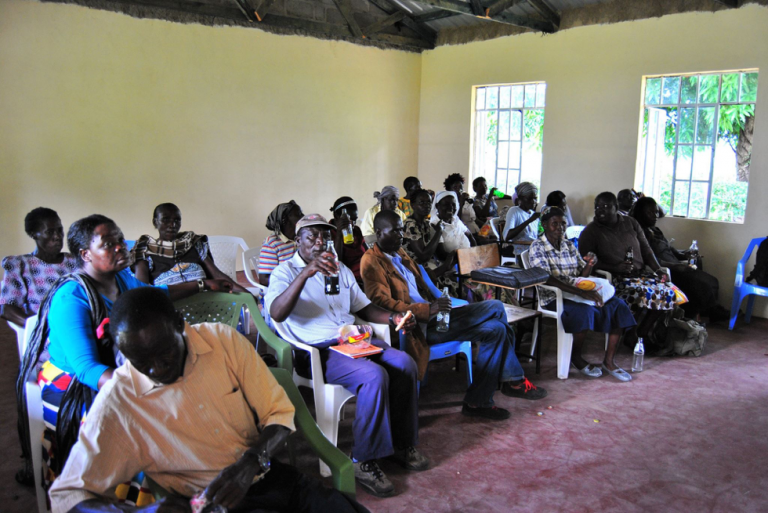Written by Kelly Leslie, MD 2019

Our GHI team (Alanna Roberts, Kate McWilliams, Lauren Kan & Kelly Leslie) plus some of our amazing partners from Kenya PCT (Partners in Community Transformation) at our first mental health workshop for Community Health Workers, where we taught them about psychosis, anxiety, depression, and substance abuse.
This year’s GHI Kenya team had an incredible experience in rural Kenya working with the community to increase awareness of mental illness and decrease stigma!
In Kenya, GHI works in collaboration with Partners in Community Transformation (PCT), a local grassroots NGO located in the Kisumu region that is passionate about helping community members develop the skills they need to make positive changes for themselves. In 2015, the GHI team in Kenya initiated a mental health education project in partnership with PCT, in response to feedback from the community about a perceived need for increased knowledge about mental health issues. Over the course of several weeks, the 2014-2015 GHI team assessed the local knowledge, practices, and perspectives around mental health in the region through interviews and focus group discussions with community members and local mental health professionals. Most notably, they identified a widespread lack of knowledge about mental illness in the community and a lack of ability for most people with mental health issues to access help due to financial constraints, pervasive stigma, and a lack of resources available.
This spring, our team traveled to the Kisumu region for 5 weeks to implement and evaluate a series of mental health education workshops. These workshops, which we prepared over the course of the school year, were based on those developed by the World Health Organization and focused on topics that were highlighted as being most important based on the previous year’s research—defining mental illness and its causes, describing the symptoms of the most common psychiatric disorders, explaining how to provide mental health first aid, and outlining the mental health resources available in the community. The target audience of our workshops consisted of Community Health Workers (CHWs), community members who go door to door across the region to teach families about health issues and refer them to further medical attention if needed. By training CHWs to recognize and respond to mental health issues in the community, we were able to ensure that this knowledge would be passed down to families across the entire Kisumu region.
Our workshops proved to be a great success. The CHWs were very receptive to the topics that we taught, and eagerly contributed to group discussions and activities, with the help of a translator who worked with us. While most of the CHWs began our mental health education program with a very limited understanding of mental illness (psychiatric symptoms are often blamed on witchcraft and curses in the Kisumu region, and very few of the CHWs had ever heard the words ‘depression’, ‘anxiety’ or ‘psychosis’ before), it was incredible to witness the progress they made throughout the 5 weeks. By the end of our program, many of the CHWs had actually been able to identify people in the community who likely suffered from psychiatric disorders, educate them and their families about mental illness, and refer them to medical attention. Based on the results of knowledge tests that we administered to CHWs both before and after the series of workshops, we were able to quantify the amount of information that the CHWs absorbed, and focus group discussions that we held with them enabled us to gather valuable feedback on the effectiveness of our program.
It was truly an amazing experience to work with the CHWs and be able to see with our own eyes the impact that the knowledge imparted by our workshops had on the community in terms of mental health awareness and the reduction of stigma. We look forward to continuing this project next year, and hope to see it uphold its success!
